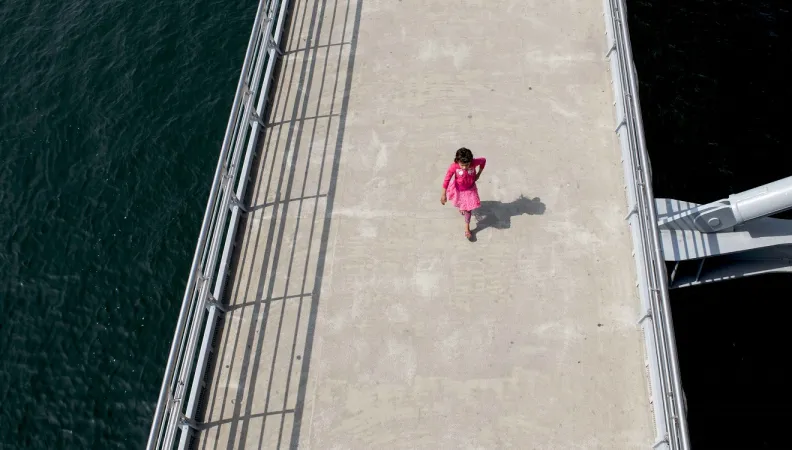Share the page
Providing Support for Sustainable Infrastructure
Published on

AFD Group backs the building, maintenance and rehabilitation of infrastructure around the world, with long-term support for housing, hospitals, transport and more. High on the agenda of the Summit for a New Global Financial Pact in Paris on June 22–23, is the question of how to boost financing for sustainable infrastructure.
Built, maintained and renovated around the world, infrastructure projects are backed by AFD in more than 100 countries, as well as the French Overseas Territories. “It’s the buildings, facilities, and equipment used to provide the many services needed for all human activities, in both the public and private spheres,” says Emmanuel Baudran, Deputy CEO in charge of Sustainable Infrastructure at AFD. “The scale of the infrastructure can vary greatly and includes subways, hydroelectric dams, drinking water networks, housing, schools, courts of justice, hospitals, libraries, and sports grounds.”
AFD’s work in infrastructure construction and rehabilitation stretches across many sectors, from energy, mobility, water and sanitation, to agriculture, education, health care and natural disaster management. We devote between €7 and €8 billion to it each year. “Infrastructure funding contributes to achieving all 17 United Nations Sustainable Development Goals (SDGs), especially for climate and gender equality,” says Emmanuel Baudran.
Socioeconomic issues
These projects meet a number of socioeconomic needs. A sewerage or electricity network, for example, will improve the living conditions of the local people. A bus network will facilitate their access to jobs in other parts of the city, and an Internet broadband connection will promote economic activity.
Sustainable infrastructure is all the more crucial in the face of climate change and efforts to preserve nature. Infrastructure associated with energy, water and sanitation, transport, and housing account for an estimated 60–80% of global greenhouse gas emissions. That’s why reducing this impact is part of AFD’s strategy. Failure to take climate change into account also leads to the risk that these facilities deteriorate more quickly in the face of rising water levels and extreme weather events.
These projects also help bolster local institutions. “We don’t just finance the construction of an infrastructure project and then move on to the next one,” says Emmanuel Baudran. “We help guide our partners over the long term, not only during the design, construction, and management of infrastructure projects, but also in the reform of public policies and the strengthening of the institutions responsible for them. Indeed, there can be no sustainable infrastructure without solid institutions and clear public policies.”
Making experts available
In practice, AFD supports States, public companies, and local authorities in the development or review of their public policies, regulatory frameworks, and investment plans (e.g., for water and energy pricing policies, sustainable mobility schemes, and land-use planning). We also provide funding to make experts and studies available to help inform the choices of decision-makers. To do so, we use financial tools such as the 2050 Facility (for long-term studies), the PEEB program (energy efficiency in buildings), Mobilize Your City (urban transport), and the CICLIA facility (sustainable cities).
In the Philippines, one of the countries most exposed to the impacts of climate change, AFD supports the country’s reforms to achieve low-carbon, resilient, and inclusive development. Technical assistance was provided to three local authorities between 2015 and 2020 thanks to €4.8 million in European Union delegated funds. This assistance helped those authorities mainstream climate change and natural disaster prevention into their urban planning process. In 2021 for example, a €250-million public policy loan was granted to the Philippines Government to strengthen natural disaster risk management at the local and national levels. It’s a package that includes a budget loan, technical support, international exchange on good practices, and political dialogue.
In Senegal, AFD is helping preparations for the Dakar Youth Olympic Games in 2026. For this, we are financing the renovation of the Iba Mar Diop stadium, the Dakar Olympic swimming pool, and the Samba Diéry Diallo horse-riding center. We’re also financing the construction of sports facilities such as soccer fields and basketball and beach volleyball courts adapted to women’s sports and to persons with reduced mobility, in neighborhoods that lack such facilities.
Public and private actions
With global Official Development Assistance amounting to less than $200 billion per year and infrastructure needs ten times higher, the private sector must also be mobilized, which is why AFD Group’s subsidiary Proparco is supporting private investment in infrastructure in the energy, transport, and telecommunications sectors in developing countries. This support makes isolated regions less remote, stimulates economic activity, and improves people’s living conditions.
In 2017, AFD and Caisse des Dépôts created the €600-million STOA fund, which provides capital for private infrastructure projects in emerging and developing countries. STOA is already involved in 15 investment operations, including the Nachtigal dam in Cameroon, solar energy in South Africa, a wind farm in the Dominican Republic, and a specialized clinic in Morocco. Its involvement provides additional impact thanks to a strong leverage effect: the funds invested by all the stakeholders of these projects in fact exceed €6 billion, or 14 times the amount made available by STOA.
STOA’s investments have a tangible impact when completed: 1.77 gigawatts of installed capacity in renewable energy, more than 3 million tons of CO2 equivalent avoided each year, 435,000 households with fiber-optic connection, and 600,000 people transported every day.
In preparation for this week’s Summit for a New Global Financial Pact, a working group co-chaired by AFD’s CEO Rémy Rioux and attended by representatives of 60 public and private institutions, considered methods for improving the financing of sustainable infrastructure in emerging and developing countries. “There are exciting discussions among different sectors like public development banks, sovereign wealth funds, and philanthropists, that normally don’t talk with one another,” says Emmanuel Baudran. “We’ll continue discussions so that we aim for the same goals: for private investors to target the SDGs more and for public development banks to mobilize the private sector more.”
